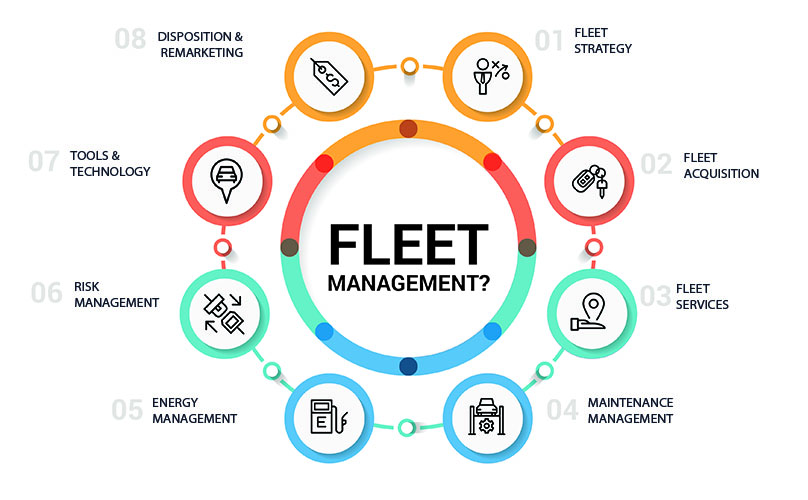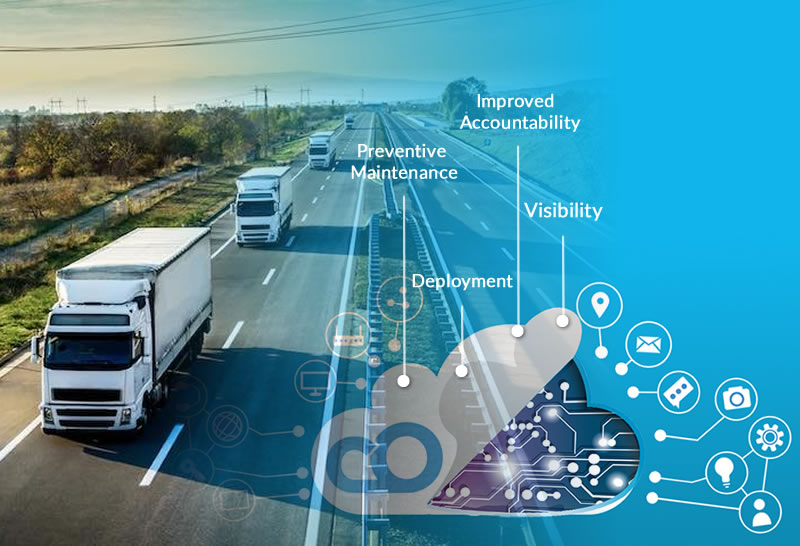Fleet management system is an intelligent technology that enables the gathering of information and reports on fleet characteristics. Fleet management helps you with the optimization of the use of fleet, the support of the supply chain, and automation of the company’s fleet management process. Most fleet management systems are using satellite services and GPS tracking systems which can provide immediate real-time data. Fleet management starts with installing a monitoring device in the ship or the vehicle, which can be a car, a truck, or a motorcycle.
The module connects itself via the GPRS system and transforms gathered data with the use of GSM network to specialized computer monitoring systems with fleet management software. As a result, the company receives processed information that can be used for the fleet management solutions and managing of company resources.

Fleet management, just as the name suggests, is simply the management process of a company’s fleet. While the term ‘fleet’ usually refers to ships, it can also be associated with a collection of aircraft or vehicles such as company cars, vans, trucks, motorcycles, etc. Benefits of fleet management systems are the varieties of fleets that can be managed and the responsibility for the cargos transport process. Fleet management solutions depend not only on the nature of the fleet but on the company’s needs to coordinate transport-related activities. These can include vehicle financing, vehicle maintenance, driver management, fuel management and vehicle telematics (vehicle tracking and diagnostics), among many other functions.
Fleet Management provide services that focus on improving efficiency, increasing productivity, reducing vehicle investment costs and risk of theft, changing driver behaviour and reducing associated transportation costs. If your company has a large fleet of vehicles, ships or aircraft and seeks for a way to manage it efficiently, fleet management services are definitely something to consider.
Fleet management system can help you track:
- Location of the fleet
- Driver’s behaviour in this moment
- Fuel expenses
- Time for fleet refuelling
- Proper use of the vehicles
- Optimal use of the vehicles
- Time for making a technical inspection
- Situation on the road
- safety of the driver and cargo
- Ways to optimize the expenses

Functionalities of Fleet Management Software
Location Tracking
Location tracking is the basic function of every vehicle fleet management software incorporated in a fleet management system. When installed in a tracking device the software enables tracking systems to operate with data about fleet’s location. Vehicle tracking software gives you access to all the information relayed by the tracking devices. This allows you see where vehicles are, adjust to traffic conditions and receive updates and alerts about any issues concerning your fleet of vehicles. Depending on the data transmission functionalities, vehicle tracking can be active or passive. When the UK fleet management software operates with historical information on the position of a vehicle or an asset, the tracking is known as passive. On contrary, real-time data for the fleet’s location allows active tracking.

Route Management
In addition to location tracking services, most fleet management programs have the feature to plan routes in real time. This is possible through GPS trackers implemented in the monitored fleet. Some UK fleet management software providers offer the possibility for navigation and two-way messaging, some of which require additional software installations. These features are of high importance for taxi companies and other organizations where communication between drivers and dispatchers is needed. GPS technologies enable dispatchers to know the exact location of each vehicle at any time, so they can plan routes efficiently and navigate the closest vehicle to any job site. To make it easier for dispatchers, some GPS trackers can automatically locate the vehicles nearest to any address. Besides planning of routes and travel times, some programmes provide real-time traffic updates. This information is used by dispatchers to warn drivers for unexpected traffic conditions such as toll roads or small streets unsuitable for large vehicles and to redirect them when needed. Efficient route management will increase driver’s safety and vehicle’s security, will save fuel costs and optimize drivers time schedule, which will increase customer service quality through accurate on-time deliveries.

Fuel Management
Fuel costs are the single most expensive operational expense for fleet owners. Therefore, controlling the fuel consumption can save money and increase productivity. Through the following advantages of fleet management managers can:
- monitor fuel information, fuel loss and consumption, refuelling locations and much more
- monitor and report fuel expense by vehicle
- plan refuelling locations
- identify suspicious fuel consumption that might indicate fraud or theft
Overall, the fuel management feature of your vehicle fleet management software will lead to decrease in fuel costs and optimization of the driving process. Fuel management is especially profitable for large fleets and long distance drivers where fuel costs add up due to the frequency or the length of taken journeys.
Driver Management
Driving behavior has a huge impact on vehicle management in relation to fuel costs, vehicle maintenance and road safety. Therefore, implementing driver policies in your company will help you cut fuel expenses and reduce accidents and associated risks and costs. By collecting data about driver’s performance such as speed, routes, timing and pauses, hard breaking, fleet management software enables managers to monitor and control the driver’s behavior.
Driving Behavior
Tracking your driver’s behavior can help you monitor the performance of planned routes and the stops and pauses your drivers make. Managers can set an alert when drivers exceed certain parameter outside the planned route. Therefore, through vehicle fleet management software, managers can save a lot of money by eliminating the unnecessary services which do not directly benefit the business.

Speed Management
Speed management is undoubtedly related to route and fuel management. When dispatchers are planning routes, speed limits are definitely something to consider in order to make route calculations and time schedule. Furthermore, fuel consumption is corresponding to the distance travelled and the speed. Driving at inappropriate speeds can increase the fuel consumption and may lead to speed fines. In the worst case, unreasonable speeds can threaten the vehicle’s and driver’s safety. Therefore, speed management is a very useful feature of fleet management software.
Fleet’s Maintenance And Diagnostics
Controlling speed, routes and fuel consumption of your fleet and increasing road safety will optimise your fleet’s performance and maintenance.
Diagnostics
Advanced vehicle fleet management software can collect data about your vehicles such as tire pressure and engine temperature that will help for vehicle diagnostics. Engine diagnostics can ensure the longevity and safety of the vehicles.
Advanced diagnostics is possible through fleet management systems where a diagnostic reporting device is installed in the vehicle in addition to the tracking device. You can get alerted in various occasions such as if the engine light comes on including the diagnostic codes that will help you identify the problem.

Preventive Maintenance
Preventive maintenance will extend the life of your equipment. Fleet management software’s preventative maintenance program can help you manage all the information about maintenance issues such as service schedules, cost, labour, parts used etc. You may receive notifications about registrations, licenses and upcoming maintenance such as next oil change, brake job, tire rotation depending on the miles travelled.
Environmental Performance
You can have the ability to track the carbon emissions of your vehicles and to optimise the sustainable fuel consumption of your fleet. Considering the carbon emissions is important for your business when it has been estimated that a reduction in global emissions of at least 50 per cent on 1990 levels is needed by 2050 according to the Intergovernmental panel on climate change reports.

Safety
Road safety is extremely important. Fleet management software in the UK collect data about driving behaviour, traffic violations, fleet’s maintenance and much more. Managers can access the report on employees accidents and costs involved. This feature helps managers to monitor drivers and vehicles behaviour and to prevent accidents through more efficient planning and strict control.Some software programmes offer the possibility for alerts and notifications in case of unpredicted situations such as unplanned routes. Advanced fleet management software has the functionality to control remotely the vehicles such as blocking the engine and the doors in case of emergency.
Reporting And Analysis
Having all the collected data about your fleet stored and organised in graphs and charts will ease vehicle tracking and will save time for administration tasks. Periodical fleet management reports and graphs on vehicle performance and maintenance can help managers find trends that may have been overlooked in the past. Reports can include any information needed regarding fleet, costs, drivers, resource allocation and more. Data from reports and graphs are stored and can be read at any time you can access the vehicle fleet management software. Fleet managers may set limits to the access of the reports and analysis since the information is of importance to the overall fleet management strategy.
Financial Management
Fleet management software may have the feature to help you manage your fleet expenses including costs from fuel, services and maintenance, insurance costs and all the financial matters of each vehicle from purchase to sale. This functionality is especially worth for companies that operate with a large fleet of vehicles or assets such as car rental, taxi or courier service companies.
Vehicle Management
Vehicle tracking is one of the most popular and basic fleet management functions nowadays because it allows managers to have a broad overview of the location and performance of their vehicles.Installed vehicle tracking systems provide information for the position of the vehicle in real time or based on stored data. Advanced vehicle tracking systems collect data also for speed, fuel consumption, the number of stops and much more.
The combination of the received data results in analysis on drivers behaviour through detailed driver profiles including the average speed, the frequency of breaks, the number of routes performed on time, etc.
Fleet management systems cover the ability to generate reports in relation to the driver identification data, for example depicting business and private trips. This will help you control and regulate your employee’s performance and thereby minimize the number of wasted mileage and fuel.
Some vehicle tracking systems can connect to the onboard computer of the vehicle and collect data such as fuel consumption and mileage, which can be used for mechanical diagnostics. Furthermore, a fleet management system makes it possible to monitor the technical aspects of the vehicles, such as tracking the maintenance tasks and reminding the user for periodic technical inspections. Fleet management enables also an automatic identification of any problems, for example exceeding the allowed engine speed. Additionally, vehicle management will also simplify the work order processes and therefore will ease the administrative work.

Cargo Management
Cargo fleet management tasks may include tracking the location of cargo over land, rail and sea, ensuring cargo security and theft prevention, and even managing temperature sensors and other functionalities that support the efficient transportation of light cargo and heavy equipment.
Shipping Fleet Management
Fleet management refers also to the management of ships in relation to ship tracking, crewing, maintenance, safety, pollution prevention, etc. Мanagement of shipping fleet is often outsourced to external companies.
Fleet Leasing
No matter which type of fleet your company has–vehicle, aircraft or ship–if it is leased through a leasing company, then fleet management can be helpful when you have to renegotiate the lease. A good fleet management system is indeed able to forecast how long fleet is going to operate, based on data from the previous run. So, it possible to negotiate the best possible lease, and maybe even cut down the budget for leasing.


Leave a comment